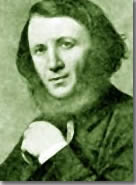Robert Browning was a renowned poet of the Victorian era and husband of Elizabeth Barrett Browning. The son of a clerk in the Bank of England, Browning was born in London in 1812 and read from his father large and eclectic library. He travelled to Russia and Italy and his first published poem "Pauline" (1833) received little notice but was criticized by John Stuart Mill for morbid exposure of emotions, which perhaps inspired Browning’s later determination to write objectively. He befriended Tennyson and Dickens, amongst others and continued writing poems and plays.  In 1845, he began corresponding with Elizabeth Barrett after admiring her volume of poems. They began a secret relationship to avoid her strict father and married and eloped to Italy in 1846. They lived mainly in Italy for her health until Elizabeth’s death in 1861 when Browning returned to England. His reputation grew considerably and he had a wide circle of friends in London society. He died in Venice in 1889.
In 1845, he began corresponding with Elizabeth Barrett after admiring her volume of poems. They began a secret relationship to avoid her strict father and married and eloped to Italy in 1846. They lived mainly in Italy for her health until Elizabeth’s death in 1861 when Browning returned to England. His reputation grew considerably and he had a wide circle of friends in London society. He died in Venice in 1889.
Browning’s poems were often in the form of dramatic monologues, drawing on the tradition of Shakespearian soliloquies and John Donne. However, his verse dramas for the stage were never successful. Early work (mostly printed at his family’s expense) includes Paracelsus (1835), Sordello (1840) Strafford (1837) and the Bells and Pomegranates pamphlet series (1841 and 1846). During his marriage to Elizabeth Barrett he wrote comparatively little especially after the poor reception to his collection of dramatic lyrics Men and Women (1855). Back in London, his Dramatis Personae (1864) won praise and recognition and his most popular work The Ring and the Book, based on an Italian court case, was published in 1868-69 and was greeted with enthusiasm, establishing him as a literary celebratory. Later compositions consisted of long narrative or dramatic poems on contemporary themes, for example Prince Hohenstiel-Schwangau (1871), Fifine at the Fair (1872), Red Cotton Night-Cap Country (1873), The Inn Album (1875), and the two series of Dramatic Idyls (1879 and 1880). He also wrote poems on classical subjects, collections of shorter poems, an elegy for a friend and a discussion of the books that had influenced him as a child.
Predominantly dramatic and satirical, Browning’s writing is typified by an ironic narrative spoken by one character telling a story, the personality emerging through his comments and the tale itself. Thus, a character is drawn for the reader to assess with the evidence provided. While favouring the failed but kind-hearted idealists, many of his characters are frauds and pedants. Often his perspectives are unusual, for example in “Fra Lippo Lippi,” the protagonist is a monk caught leaving a brothel and in “My Last Duchess”, a duke talks of the painting of his last wife who he probably murdered (see question below). The poems are psychological studies of mental processes, sometimes changing mood in an attempt to seek a transcendental truth from the patterns of everyday observations.
Q